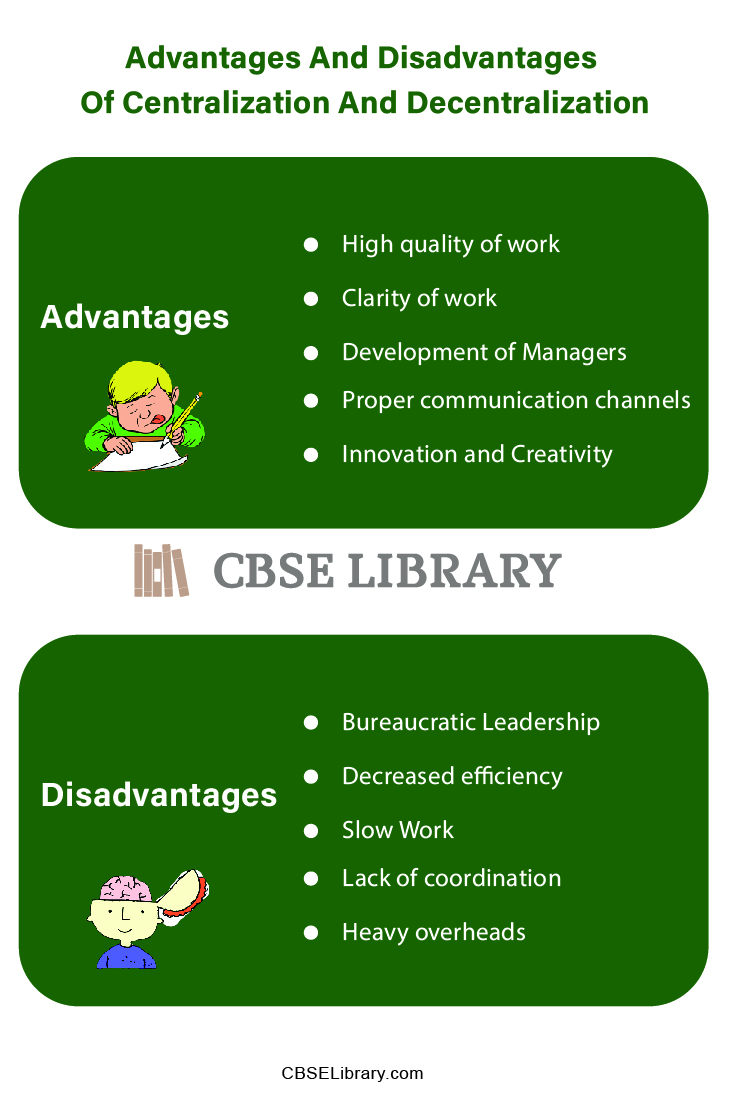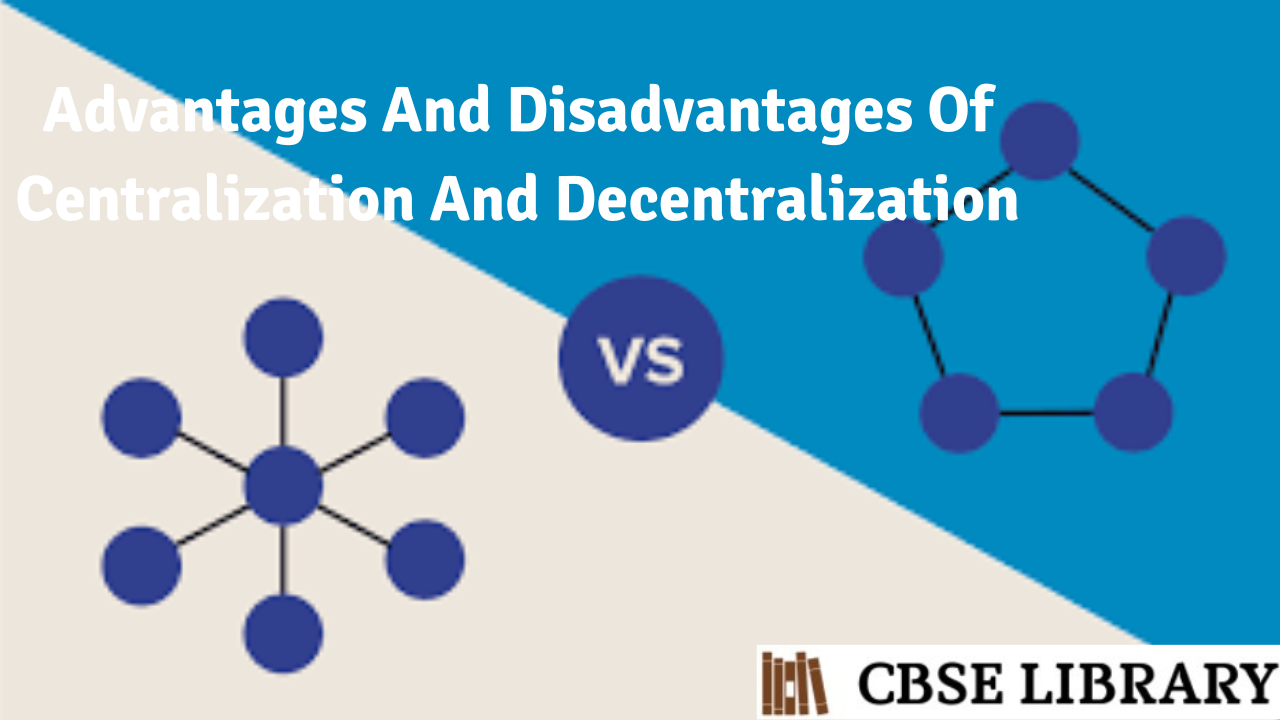Advantages And Disadvantages Of Centralization And Decentralization: The centralization of authority is the systematic and consistent retention or concentration of power for decision-making at the top or upper levels of management. An organization is considered centralised when top management has control over almost all decisions concerning its operation.
Suppose we take the example of a medium-sized stationery manufacturing company. Its owner and his two daughters manage the company. Each department has a qualified manager, who is responsible for purchasing, stores, marketing, and accounts.
Students can also find more Advantages and Disadvantages articles on events, persons, sports, technology, and many more.
However, all decisions concerning the purchase of materials, production of ballpoint pens, and marketing of the products are made by the owners and their daughters, who also supervise the activities of various departments. The managers of the various departments are then expected to carry out the instructions, such is the nature of a centralised organization.
Decentralization implies dividing up authority in all departments and at all levels of management to be able to make appropriate decisions and actions.
Consider, for example, a large steel manufacturing company. Its board of directors and president express the organization’s overall goals and policies. Major decisions relating to product lines, capital investments, and marketing methods are made by the heads of the various departments.
Marketing managers, for example, are in charge of deciding the quality and price of products, determining distribution channels, choosing advertising methods, and scheduling sales campaigns. The company’s top management does not interfere with its authority, but departmental managers are required to keep in mind the company’s policies and to make decisions based on their jurisdiction. This is the way decentralized organisations operate.
What are Centralization and Decentralization? Advantages and Disadvantages of Centralization and Decentralization
According to Henri Fayol, “Everything which goes to increase the subordinate’s role is decentralisation, everything which goes to decrease it is centralisation.”
The key decision-makers in a centralised organization are one or a few managers at the top; managers at middle and lower levels are given very little authority; they have to rely on top management for guidance and instruction in their daily activities; they are expected to exhibit little initiative and initiative in their day-to-day activities; In an organization, all activities are closely monitored and controlled by the top management.
According to Louis Allen decentralisation is “the systematic effort to delegate to the lowest levels all authority, except that which can be exercised at central points. An organisation is decentralized when middle and lower-level managers are given the authority to make decisions and take action related to their areas of responsibility. The top management has the authority to make major decisions and develop policies for the organization as a whole. Besides retaining overall control and coordination, the top management is also responsible for coordinating and directing the organisation. Decentralisation is much more than merely transferring authority to the lower levels. It is a philosophy of selective dispersal of authority.
Centralization and decentralisation are opposed terms, they cannot be confused with work location. For example, an organization with branches in many cities might be centralised.
- Advantages of Centralization and Decentralization
- Disadvantages of Centralization and Decentralization
- FAQ’s on Advantages And Disadvantages Of Centralization And Decentralization
Advantages of Centralization and Decentralization
The Advantages of Centralization are as follows:-
High quality of work: When specific procedures and duties are defined, each employee knows their responsibilities, resulting in high quality of work, and by having managers supervise departments, uniform outputs are produced.
Clarity of work: Organizations with clear goals and a mission statement benefit from centralization as their vision are clearly communicated and their work is delegated with clarity.
Proper communication channels: With the implementation of centralization, proper communication channels are established. It facilitates indirect supervision and control, leading to quality results without any duplication of effort or quality concern.
The Advantages of Decentralization are as follows:-
Increase in Efficiency and Productivity: Decentralisation helps to reduce the amount of time and effort spent by top executives on routine operational decisions, which allows them to devote more time to important policy matters.
Innovation and Creativity: With the help of decentralization, it is possible for the top management to extend its lead over such a large enterprise; It is possible to create a sense of competition among divisions or departments; It is possible to grow and diversify the enterprise.
Development of Managers: In a decentralized system, subordinates are empowered to exercise their own judgment, and they learn to properly exercise it
| Advantages of Centralization | Advantages of Decentralization |
| Suitable for small enterprises | Better decision making |
| Enhanced productivity and efficiency | Reduction in burden of top executives |
| Better Coordination | Efficient supervision and control |
| Quick decision making | Proper communication |
Disadvantages of Centralization and Decentralization
The Disadvantages of Centralization are as follows:-
Bureaucratic Leadership: Bureaucracy provides employees with a similar structure to centralized management, where employees are expected to execute decisions and follow senior management orders. As low-level staff have no input in the decision-making process, there are inconveniences at work, and the senior management blames employers due to bureaucratic leadership.
Decreased efficiency: Employees’ work efficiency decreases because of bureaucratic leadership and slow work without individual initiative.
Slow Work: Centralization slows the work; decisions made at the top take a long time to take effect and to be implemented; due to formalities, work is always delayed.
The Disadvantages of Decentralization are as follows:-
Lack of coordination: The decentralization may create problems with coordination among departments, Semi-autonomous divisions tend to adopt a narrow perspective, section interests may override the organization’s goals, and a loss of control and disintegration of the company may occur as a result.
Lack of uniformity: Decentralized units may not follow uniform policies and procedures, resulting in inconsistency in organizational activities.
Heavy overheads: The decentralization process may result in increased administrative costs since it requires highly qualified managers to supervise different divisions. Furthermore, many staff functions and facilities need to be duplicated. To perform decision-making functions efficiently, lower-level managers are needed.
| Disadvantages of Decentralization | Disadvantages of Centralization |
| Less authority | Unsuitable for small enterprises |
| Bureaucratic management | Lack of coordination |
| Lack of communication | External restrictions |
| Reduce scope of specialization | Lack of uniformity |

FAQ’s on Advantages And Disadvantages Of Centralization And Decentralization
Question 1.
What are Centralization and Decentralization?
Answer:
According to Henri Fayol, “Everything which goes to increase the subordinate’s role is decentralisation, everything which goes to decrease it is centralisation.”
Question 2.
Difference between Centralization and Decentralization?
Answer:
There are two ways of working in an organization: Centralization and Decentralization. In centralization, there are formal authorities that have the authority to make all important decisions, but in decentralization, these are delegated to lower levels in the organization.
Question 3.
What are the Advantages and Disadvantages of Centralization?
Answer:
Advantages:-
| Suitable for small enterprises |
| Enhanced productivity and efficiency |
| Better Coordination |
| Quick decision making |
Disadvantages:-
| Less authority |
| Bureaucratic management |
| Lack of communication |
| Reduce scope of specialization |
Question 4.
What are the Advantages and Disadvantages of Decentralization?
Answer:
| Advantages of Decentralization |
| Better decision making |
| Reduction in burden of top executives |
| Efficient supervision and control |
| Proper communication |
| Disadvantages of Decentralization |
| Unsuitable for small enterprises |
| Lack of coordination |
| External restrictions |
| Lack of uniformity |
